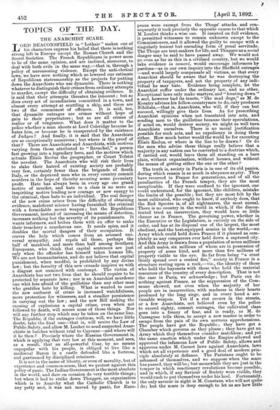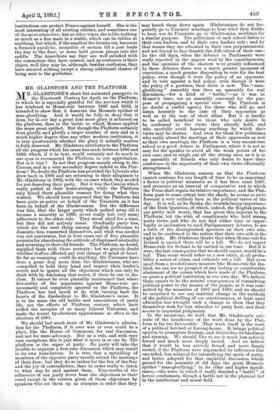TOPICS OF THE DAY.
THE ANARCHIST SCARE. LORD BEACONSFIELD in " Lothair " makes one of his characters express his belief that there is nothing strong left in Europe except the Roman Church and the Secret Societies. The French Republicans in power seem to be of the same opinion, and are inclined, moreover, to deal with both evils in the same way,—that is, through a policy of unreasoning violence. Except the anti-clerical laws, we have seen nothing which so lowered our estimate of Republican statesmanship as the projects for putting down the Anarchists who use dynamite. There is nothing whatever to distinguish their crimes from ordinary attempts to murder, except the difficulty of obtaining evidence. It is said that their attempts threaten the innocent ; but so does every act of incendiarism committed in a town, and almost every attempt at scuttling a ship, and these are two of the commonest of offences. It is said, too, that dynamite outrages are crimes without hope of gain to their perpetrators ; but so are all crimes of malice or of vengeance. What does it matter to the police whether a man shoots at Lord Coleridge because he hates him, or because he is exasperated by the existence of Judges ? And finally, it is said that the Anarchists are so exceptionally numerous ; but where is the proof of that There are Anarchists and Anarchists, with motives varying from those attributed to " Ravachol," a person fast growing into a legendary hero, and the motives which actuate Elise Reclus the geographer, or Count Tolstoi the novelist. The Anarchists who will risk their lives to slake their hatred of existing society are probably very few, certainly fewer than the brigands of South Italy, or the depraved men who in every country commit murders in the hope of thereby securing some pecuniary profit. Hate has always been in every age one grand. motive of murder, and hate to a class is no more an inspiriting motive lending new courage or new energy to the criminal, than hate to an individual. The real danger of the new crime arises from the difficulty of obtaining evidence, maleficent science having furnished the criminal with a formidable secret weapon ; but the Republican Government, instead of increasing the means of detection, increases nothing but the severity of its punishments. It wants informers, and bribes them with an offer to make their treachery a murderous one. It needs spies, and it doubles the mortal dangers of their occupation. It craves the help which comes from an aroused uni- versal sympathy, and repels all those, perhaps the half of mankind, and more than half among Southern Europeans, who think that capital sentences are just only when the offender has himself taken human life. We are not humanitarians, and do not believe that capital punishment, when needful, is prohibited by any divine law ; but the ferocity of this new crusade inspires us with a disgust not unmixed with contempt. The victim of Anarchists has not two lives that he should require to be protected by separate laws ; nor is an Anarchist murderer one whit less afraid of the guillotine than any other man who gratifies hate by killing. What is wanted to meet the new outburst of crime is increased watchfulness, more protection for witnesses, and a steadier persistence in carrying out the law ; and the new Bill making the causing of explosions a capital crime, even when not followed by death, will secure none of those things. Nor will any further step which may be taken on the sameline. The Republic, if the outrages continue, will, we have little doubt, take the final one—that is, will revive the Law of Public Safety, and allow M. Loubet to send. suspected Anal% chists in batches without trial to Cayenne—and where will it be then ? Precisely where the Russian Government is, which is applying that very law at this moment, and sees, as a result, that an all-powerful Czar, by no means unpopular with his people, is obliged to live like a medimval Baron in a castle defended like a fortress, and garrisoned by disciplined retainers. It is not in the name of liberty, or even of morality, but of experience and 6ommon-sense, that we protest against this policy of panic. The Indian Government is the most absolute in the world, and dare on occasion do very terrible things ; but when it had to strike down Thuggee, an organisation which is to Anarchy what the Catholic Church is to any petty sect, it was not moved by panic, for Euro- peans were exempt from the Thugs' attacks, and con- sequently it took precisely the opposite course to that which M. Loubet thinks a wise one. It insisted on full evidence, it permitted witnesses to remain unknown except to the Commissioners, and it allowed. the guilty to escape with a. singularly lenient but unending form of penal servitude. The Thugs are tent-makers for life, and Thuggee as a social/ danger may be said to have passed away. We would not go even as far as this in a civilised country, but we would take evidence in camerd, would encourage informers by pardons—as in our own inquiry into the Sheffield outrages —and would largely compensate all victims, so that every Anarchist should be aware that he was destroying the property of taxpayers, and not the property of any indi- vidual he may hate. Evidence being complete, let the Anarchist suffer under the ordinary law, and no other. Exceptional laws only make martyrs, and "hunting down a sect, however bad its tenets, "like mad dogs," as M. de Keratry advises his fellow-countrymen to do, only produces Nihilists,—that is, Anarchists, who will, if they can but succeed, willingly give their lives. As for proscribing Anarchist opinions when not translated into acts, and sending men. to the guillotine because their speculations, if acted on, would destroy society, we might as well turn Anarchists ourselves. There is no moral justification possible for such acts, and no expediency in doing them either. How much better would the world be for executing Elie& Reclus, or where is the line to be drawn ? Or do the men who advise these things really believe that a majority in any nation can be converted to a doctrine which, if carried out, would leave them all standing on a bare plain, without organisation, without houses, and without the means of getting either the one or the other ?
The truth is, society in Paris is in one of its old panics, during which reason is as much in abeyance as pity. They have recurred in France for generations, and of all the peculiarities of the French temper, they are the most inexplicable. If they were confined to the ignorant, one could understand, for the ignorant, like children, mistake the limits of the possible ; but they are most felt by the most cultivated, who ought to know, if anybody does, that the Red Spectre is, of all nightmares, the most unreal. There is no country in the world in which, if the discon- tented tried an insurrection, they would. have so little chance as in France. The governing power, whether in the Executive or the Legislature, is entirely on the side of order, and has at its disposal one of the largest, the most obedient, and the best-equipped armies in the world,—an Army which could hold down France if it pleased as com- pletely as any conquerors ever held down a captured city. And this Army is drawn from a population of seven millions of adult males, six millions of whom are in possession of property of some kind, and more than five millions of property visible to the eye. So far from being "a crust thinly spread over a central fire," society in France is a structure resting upon a rock,—viz., the identity of those who hold the bayonets with those who hold the material resources of the country of every description. That is not the case in Paris, we acknowledge ; but Paris can do, nothing against France, as the suppression of the Com- mune showed, not even when the majority of her people are in insurrection, with madness in their hearts produced by the long siege, and in every hand. a ser- viceable weapon. Yet if a riot occurs in the streets, or a few Anarchists, not believed even by the police to exceed eighty, commit outrages, the cultivated class goes into a frenzy of fear, and is ready, as M. de Cassagnac tells them, to accept a new master in order to. escape from the pain of its own nervous apprehensions. The people have got the Republic ; they have got a Chamber which governs as they please ; they have got an Army which they themselves consider matchless ; and yet the same emotion which under the Empire allowed and approved the infamous Law of Public Safety, allows and approves under M. Carnot laws against Anarchists, laws which set all experience and. a good deal of modern prin- ciple absolutely at defiance. The Parisians ought to be ashamed of themselves, and we suppose when the scare has passed, they will be ; but meanwhile they are just in the temper in which reactionary revolutions become possible, and in which, if any Saviour of Society were visible, they would rush to put themselves under his heel. Fortunately,. the only saviour in sight is M. Constans, who will not quite- do ; but the scare is deep enough to let us see how little institutions can protect France against herself. She is the most interesting of all existing entities, and sometimes one of the most attractive; but at other times she is like nothing so much as a fine mare in a stable, which can be ridden at anything, but which, if the smallest fire breaks out, becomes a frenzied paralytic, incapable of motion till a goat leads the way to the door, or some bold groom jumps into the saddle. The Anarchists say they are well satisfied with the commotion they have created, and as confusion is their object, well they may be, although, besides confusion, they have secured nothing except a strong additional chance of being sent to the guillotine.



































 Previous page
Previous page